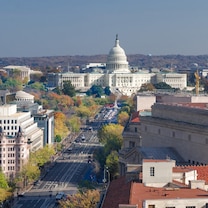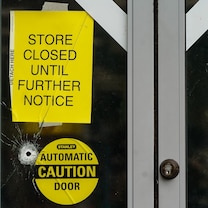Judge rejects DOJ's request to unseal Ghislaine Maxwell grand jury testimony

A federal judge in New York has denied the Trump administration's motion to unseal grand jury testimony from the criminal case against Jeffrey Epstein associate Ghislaine Maxwell.
The Trump administration has been seeking to release materials related to the investigation into Epstein, the wealthy financier and convicted sex offender who died by suicide in jail in 2019, following the blowback it received from MAGA supporters after it announced last month that no additional files would be released.
Maxwell, a longtime associate of Epstein, is currently serving a 20-year prison sentence for sex trafficking and other offenses in connection with Epstein.
In his 31-page opinion, U.S. District Judge Paul Engelmayer of the Southern District of New York criticized the Department of Justice for using "demonstrably false" reasoning to justify the release of grand jury testimony.
The transcripts would "not reveal new information of any consequence" about Epstein and Maxwell's crimes, according to Judge Engelmayer, who suggested that the Trump administration's push to release documents might be an intentional "diversion."
"Its entire premise -- that the Maxwell grand jury materials would bring to light meaningful new information about Epstein's and Maxwell's crimes, or the Government's investigation into them -- is demonstrably false," he wrote.
Engelmayer wrote that the transcripts contain material already in the public record and lack any firsthand information about Epstein's and Maxwell's crimes. The records do not identify anyone other than Epstein or Maxwell who had sexual contact with a minor, mention any clients, shed light on their methods, or provide new information about Epstein's death, Engelmayer wrote.

"Insofar as the motion to unseal implies that the grand jury materials are an untapped mine lode of undisclosed information about Epstein or Maxwell or confederates, they definitively are not that. A 'public official,' 'lawmaker,' 'pundit,' or 'ordinary citizen' 'deeply interested and concerned about the Epstein matter,' and who reviewed these materials expecting, based on the Government's representations, to learn new information about Epstein's and Maxwell's crimes and the investigation into them, would come away feeling disappointed and misled. There is no 'there' there," the judge wrote.
Engelmayer also suggested that the only reason that might justify the release of the records would be to "expose as disingenuous the Government's public explanations for moving to unseal."
"A member of the public, appreciating that the Maxwell grand jury materials do not contribute anything to public knowledge, might conclude that the Government's motion for their unsealing was aimed not at 'transparency' but at diversion -- aimed not at full disclosure but at the illusion of such," he wrote.
Engelmayer is the second judge to deny the administration's motions to unseal secret grand jury testimony related to Epstein and Maxwell. Last month, U.S. District Judge Robin Rosenberg dismissed the DOJ's motion to unseal testimony from the first federal investigation of Epstein in Florida that began in the mid-2000s.
A third federal judge in New York is still considering the administration's request to unseal testimony in the second Epstein investigation in 2019.
The government's move to unseal grand jury testimony came after the Trump administration faced backlash for its decision last month not to release any further materials from investigations against Epstein and Maxwell, after repeated statements that it planned to do so.
According to a three-page evidence list released by the Justice Department in February, the government is in possession of more than 300 gigabytes of data obtained during those investigations. The remaining materials include 40 computers and electronic devices, 26 storage drives, more than 70 CDs and six recording devices, according to the evidence index.
The evidence also includes approximately 60 pieces of physical evidence, including photographs, travel logs, employee lists, more than $17,000 in cash, five massage tables, blueprints of Epstein's island and Manhattan home, four busts of female body parts, a pair of women's cowboy boots and one stuffed dog, according to the list.
The unreleased evidence notably includes multiple documents related to two islands Epstein owned in the U.S. Virgin Islands, Little Saint James -- where his compound was located -- and Greater Saint James. According to the index, the files include a folder containing Island blueprints, photographs and other documents.
Some of the documents could shed light on who visited the island. According to the index, the files also include a Little Saint James logbook as well as multiple logs of boat trips to and from the island.
Epstein died by suicide in 2019 while facing federal child sex trafficking charges. The well-connected financier has long been rumored to have kept a "client list" of celebrities and politicians, which right-wing influencers have baselessly accused authorities of hiding.
The Justice Department and FBI announced last month that they had found no evidence that Epstein kept such a list, after several top officials, before joining the administration, had themselves accused the government of shielding information regarding the Epstein case.
In its joint memo, the FBI and DOJ argued that a "large portion" of the records included photographs of victims and child pornography. According to the DOJ, the evidence includes "images and videos" of victims who appear to be minors, "over ten thousand downloaded videos and images of illegal child sex abuse material and other pornography," and a "large volume" of images of Epstein.
"While we have labored to provide the public with maximum information regarding Epstein and ensured examination of any evidence in the government's possession, it is the determination of the Department of Justice and the Federal Bureau of Investigation that no further disclosure would be appropriate or warranted," the memo said.
ABC News








